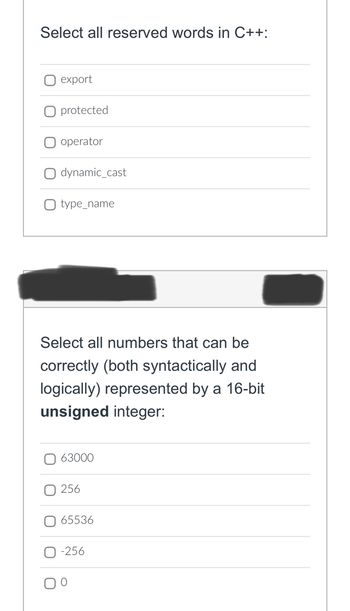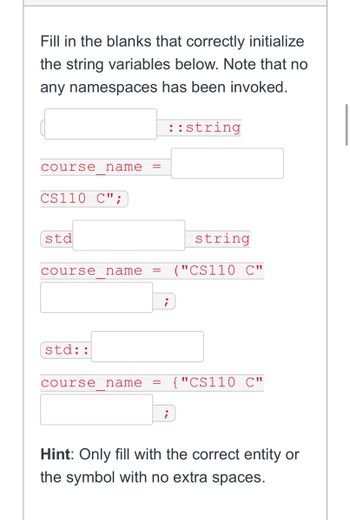
Database System Concepts
7th Edition
ISBN: 9780078022159
Author: Abraham Silberschatz Professor, Henry F. Korth, S. Sudarshan
Publisher: McGraw-Hill Education
expand_more
expand_more
format_list_bulleted
Question

Transcribed Image Text:Select all reserved words in C++:
export
protected
operator
dynamic_cast
type_name
Select all numbers that can be
correctly (both syntactically and
logically) represented by a 16-bit
unsigned integer:
63000
256
65536
-256

Transcribed Image Text:Fill in the blanks that correctly initialize
the string variables below. Note that no
any namespaces has been invoked.
course name
CS110 C";
std
course name =
std::
course name =
;
;
::string
string
("CS110 C"
{"CS110 C"
Hint: Only fill with the correct entity or
the symbol with no extra spaces.
Expert Solution
This question has been solved!
Explore an expertly crafted, step-by-step solution for a thorough understanding of key concepts.
This is a popular solution
Trending nowThis is a popular solution!
Step by stepSolved in 2 steps

Knowledge Booster
Learn more about
Need a deep-dive on the concept behind this application? Look no further. Learn more about this topic, computer-science and related others by exploring similar questions and additional content below.Similar questions
- Need help completing C++ program #include #include #include #include #include static pthread_mutex_t bsem; static pthread_cond_t waitTurn = PTHREAD_COND_INITIALIZER; static int turn; static int nthreads; void *print_in_reverse_order_odd_then_even(void *void_ptr_argv) { // std::cout << "I am Thread " << /*variable identifier*/ << std::endl; return NULL; } int main() { std::cin >> nthreads; pthread_mutex_init(&bsem, NULL); // Initialize access to 1 pthread_t *tid= new pthread_t[nthreads]; int *threadNumber=new int[nthreads]; //HINT: this code determines the starting thread (thread with the highest odd number). //You can erase this if statement if your solution does not need to know the starting child thread number. if ((nthreads-1)%2!=0) turn = nthreads -1; else turn = nthreads -2; for(int i=0;iarrow_forwardLanguage is c++arrow_forwardIn c++ program execution starts in O top of code O main function O you can specify the locationarrow_forward
- C++ Programmingarrow_forwardLook at the following C++ code and comment each line about how it works with pointer. int i = 33; double d = 12.88; int * iPtr = &i; double * dPtr = &d; // iPtr = &d; // dPtr = &i; // iPtr = i; // int j = 99; iPtr = &j; //arrow_forwardThis assignment is not graded, I just need to understand how to do it. Please help, thank you! Language: C++ Given: Main.cpp #include #include "Shape.h" using namespace std; void main() { /////// Untouchable Block #1 ////////// Shape* shape; /////// End of Untouchable Block #1 ////////// /////// Untouchable Block #2 ////////// if (shape == nullptr) { cout << "What shape is this?! Good bye!"; return; } cout << "The perimeter of your " << shape->getShapeName() << ": " << shape->getPerimeter() << endl; cout << "The area of your " << shape->getShapeName() << ": " << shape->getArea() << endl; /////// End of Untouchable Block #2 //////////} Shape.cpp string Shape::getShapeName() { switch (mShapeType) { case ShapeType::CIRCLE: return "circle"; case ShapeType::SQUARE: return "square"; case ShapeType::RECTANGLE: return "rectangle"; case…arrow_forward
- Select the correct option for the question shown below.arrow_forwardConvert from C to C++ .Thank you. / include all required libraries#include<stdio.h>#include<stdlib.h>#include<sys/types.h>#include<sys/wait.h>#include<unistd.h> // variable to store number of generationsint num_generations; // function to print the generationsvoid printGeneration(int n){// stop if number of generations are reachedif(n>num_generations)return; // create a forkpid_t p = fork(); // generate new generationsif(p==0)printGeneration(n+1);else if(p>0)wait(0); // wait until child process terminates // print the present generationif(p!=0){// if n is 0if(n==0)printf("Parent. "); // print parent// if n is 1else if(n==1)printf("Child. "); // print child// for all other caseselse{// print grandchildrenfor(int i=0;i<n-2;i++)printf("Great ");printf("Grandchild. ");}// print pid and ppidprintf("pid: %d ppid: %d\n",getpid(),getppid());}} // main functionint main(int argc, char* argv[]){// if no arguments are providedif(argc==1){// print…arrow_forwardC++ printSmaller is a function that accepts two int parameters and returns no value. It will print the value of the smaller one parameters. The function protoype is as follows: void printSmaller(int num1, int num2); write the statments to read two integers and call this function to display the smaller one.arrow_forward
arrow_back_ios
arrow_forward_ios
Recommended textbooks for you
 Database System ConceptsComputer ScienceISBN:9780078022159Author:Abraham Silberschatz Professor, Henry F. Korth, S. SudarshanPublisher:McGraw-Hill Education
Database System ConceptsComputer ScienceISBN:9780078022159Author:Abraham Silberschatz Professor, Henry F. Korth, S. SudarshanPublisher:McGraw-Hill Education Starting Out with Python (4th Edition)Computer ScienceISBN:9780134444321Author:Tony GaddisPublisher:PEARSON
Starting Out with Python (4th Edition)Computer ScienceISBN:9780134444321Author:Tony GaddisPublisher:PEARSON Digital Fundamentals (11th Edition)Computer ScienceISBN:9780132737968Author:Thomas L. FloydPublisher:PEARSON
Digital Fundamentals (11th Edition)Computer ScienceISBN:9780132737968Author:Thomas L. FloydPublisher:PEARSON C How to Program (8th Edition)Computer ScienceISBN:9780133976892Author:Paul J. Deitel, Harvey DeitelPublisher:PEARSON
C How to Program (8th Edition)Computer ScienceISBN:9780133976892Author:Paul J. Deitel, Harvey DeitelPublisher:PEARSON Database Systems: Design, Implementation, & Manag...Computer ScienceISBN:9781337627900Author:Carlos Coronel, Steven MorrisPublisher:Cengage Learning
Database Systems: Design, Implementation, & Manag...Computer ScienceISBN:9781337627900Author:Carlos Coronel, Steven MorrisPublisher:Cengage Learning Programmable Logic ControllersComputer ScienceISBN:9780073373843Author:Frank D. PetruzellaPublisher:McGraw-Hill Education
Programmable Logic ControllersComputer ScienceISBN:9780073373843Author:Frank D. PetruzellaPublisher:McGraw-Hill Education

Database System Concepts
Computer Science
ISBN:9780078022159
Author:Abraham Silberschatz Professor, Henry F. Korth, S. Sudarshan
Publisher:McGraw-Hill Education

Starting Out with Python (4th Edition)
Computer Science
ISBN:9780134444321
Author:Tony Gaddis
Publisher:PEARSON

Digital Fundamentals (11th Edition)
Computer Science
ISBN:9780132737968
Author:Thomas L. Floyd
Publisher:PEARSON

C How to Program (8th Edition)
Computer Science
ISBN:9780133976892
Author:Paul J. Deitel, Harvey Deitel
Publisher:PEARSON

Database Systems: Design, Implementation, & Manag...
Computer Science
ISBN:9781337627900
Author:Carlos Coronel, Steven Morris
Publisher:Cengage Learning

Programmable Logic Controllers
Computer Science
ISBN:9780073373843
Author:Frank D. Petruzella
Publisher:McGraw-Hill Education